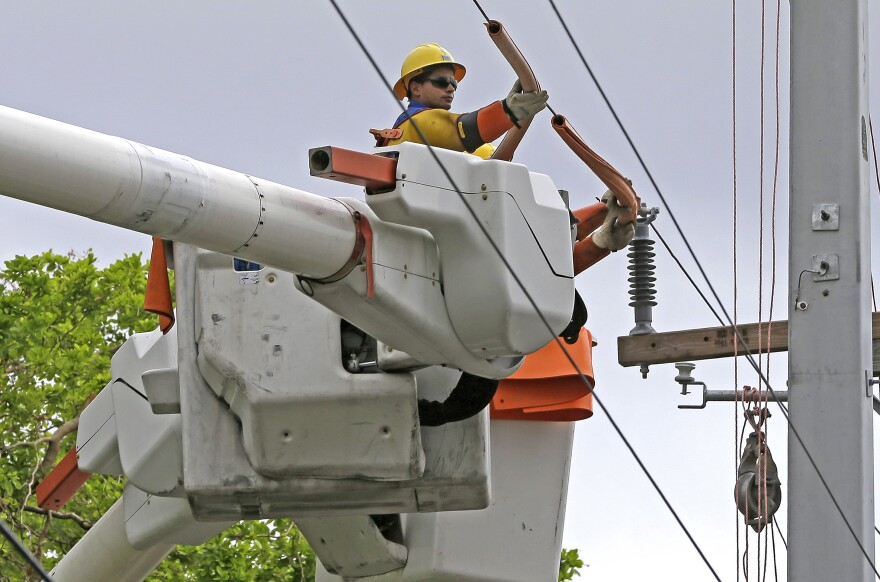When Florida is hit by a hurricane, utility companies must go in and help recover immediately. They pay for the cost up front and later charge customers to recoup their losses. A senate bill aims to lower both the price tag and time of recovery by forcing utility companies to strengthen their infrastructure before a storm.
“We’ve had Michael, Irma and Matthew over the last three years wreak havoc on our state and Florida’s done a very good job of pre-storm preparation and post-storm recovery efforts. But we can do better as a state," said Rep. Joe Gruters (R-Sarasota)
When storms like those hit it causes utility rates to rise because of companies trying to recoup the costs they spent to rebuild the infrastructure in impacted areas.
“In the panhandle right now, there’s a case in front of the of the public service commission where Gulf Power is asking for an 8.50 per rate user increase per month as a result of the cost it took to rebuild that network," said Gruters.
He wants to change the way public utility companies operate by requiring them to create better transmission and distribution storm protection plans. Those plans would focus on three things.
“How we can make our state more resilient, how we can make our electrical grid stronger and how we can bring people, especially the most vulnerable among us, back and get people back to work as quickly as possible," said Gruters.
He wants greater focus on shoring up overhead electric transmission lines, more buried lines and more aggressive tree trimming. The State Republican Party Chairman says he wants to make sure the state can get back to normal as soon as possible after storms.
“What this hardening project will hopefully do is not only get our state back to work immediately. But it will hopefully reduce the costs of those post-storm recovery efforts and hopefully slash them," said Gruters.
His plan includes a cost recovery mechanism for burying power lines. He says it will help poor communities the most because often they are the ones who suffer most.
“If you have the resources, you can escape the storm. If you have a good job you can withstand. Me personally both of my offices and my house go down for six days. a lot of people don’t have the ability to deal with that. I continued to make payroll on behalf of my employees, but some people can’t if your living paycheck to paycheck and they say 50% of Americans can’t survive not having a paycheck for one consistent month. And if you’re out of work your out of luck," said Gruters.
Right now communities typically get their lines buried by teaming up to foot the cost themselves. But Gruters says some communities can’t afford it.
“A lot of newer communities there are no feeder lines going into homes, you see that. And some of these neighborhoods are the first ones with their power back up. But then some of the communities that need the most help they will never have their lines buried unless we go to this type of plan. A longer range plan for the entire state because the cost are going to be spread through the rate base, throughout the state of Florida," said Gruters.
Jon Moyle with the Florida Industrial Power Users Group opposes the plan. He says the initial costs of this project are too high.
“Some people have called this the 30-billion-dollar rate hike bill," said Moyle.
Moyle says the current process is best because it charges the people who would benefit directly from the service.
“Some people Senator Montford you have a lot of cities and counties. They would say well the city of Pensacola or seaside wants to underground that’s on them we should have people living in counties subsidizing the cities," said Moyle.
But Gruters says this helps everybody not just the city that gets worked on first.
“At the end of the day we’re all interconnected, all of us. It doesn’t matter where you are in the state, rich or poor area. If a third of our state goes down it’s a billion dollars a day,” said Gruters.
And Sen. Oscar Braynon (DMiami Gardens) agrees. He represents both impoverished and wealthy areas and thinks Gruter’s plan is fair.
“Now there are other ways, other options. But this is one that I think he said where everyone pays to harden our entire system. And to me that makes since and that’s the only fair way I’m ever going to get hardening - whether it be undergrounding, whether it be stronger poles – I’ll ever get that in some of my lower income areas. And so that’s a matter of fairness and for me that’s why I support the bill," said Braynon.
The Senate bill is headed to the floor after passing each of its three committees unanimously. The house bill is waiting to be scheduled for its 3rd committee hearing and so far hasn’t received a down vote.





